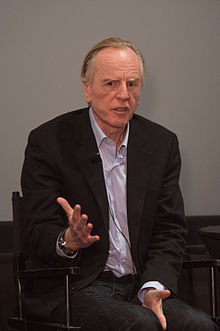John Sculley
John Sculley (* 9. April 1939 in New York City ) is a US -American Manager . He was Vice President of Pepsi Cola USA and President and CEO of Apple Computer from 1983 to 1993 . Sculley holds a Bachelor of Arts ( BA ) in Architecture from Brown University and a Master of Business Administration ( MBA ) from Wharton School .
Life
John Sculley was enthusiastic about electronics from an early age. At the age of 14 he invented a picture tube for color television. However, his patent application was rejected because a scientist had applied for a patent for precisely this principle a few weeks before him. His patent later formed the basis for Sony's Trinitron tube .
Sculley joined PepsiCo at the request of his father-in-law, Donald M. Kendall , President of PepsiCola . He passed through the company and was most recently famous as head of marketing through two lifestyle advertising campaigns: "The choice of a new generation" and: "Pepsi Challenge" . They earned him the reputation of a marketing genius and led PepsiCo to number one in soft drinks ahead of Coca-Cola.
The expanding company Apple was urgently looking for a CEO at the time . In November 1982, Sculley received a call from Gerry Roche, an Apple-appointed recruiter. Sculley initially rejected a move to Apple. Over the next several months, however, he met with Apple founder Steve Jobs for informal talks and a friendship developed between the two. Sculley's passion for electronics was reborn. He was particularly fascinated by the Lisa and Macintosh projects . But Sculley remained undecided until Steve Jobs offered him high financial offers and the sentence:
"Do you want to sell sugar water for the rest of your life, or do you want to take the chance and change the world?"
convinced to work for Apple.
Sculley initially succeeded in everything at Apple. He was responsible for the introduction of the Macintosh and refused to give licenses to clone manufacturers. Under his leadership, Apple developed numerous trend-setting products, such as the LaserWriter , the HyperCard multimedia program , the AppleTalk network protocol , the portable Macintosh Portable and the Apple PowerBook , System 7 , the Newton and the Apple Power Macintosh . Under his leadership, Apple's annual revenue rose from $ 600 million to $ 8 billion. He won the power struggle between himself and Steve Jobs in 1985, which is why Jobs left Apple and founded NeXT .
In a 1987 Playboy interview, Sculley made some famous predictions. He predicted, among other things, the importance of optical storage media ( CD-ROM ) for use by computers. Some of his ideas for the Knowledge Navigator were not realized by Apple itself, but on the Internet and the World Wide Web .
At Apple, the Sculley era was shaped by market segmentation and its further subdivision. Many almost identical products were positioned under different names in the three main markets - private customers, educational institutions and corporate customers. This marketing strategy led to high production and marketing costs and to uncertainty among potential buyers. The unnecessary multitude of products and falling profits caused the Apple board of directors to fire Sculley. In 1993 he was replaced on the board by Michael Spindler . Sculley then went into politics to support Bill Clinton in the presidential election. Today he runs a private investment company.
literature
- John Sculley and John A. Byrne: My Careers at PepsiCo and Apple. Econ Verlag, Düsseldorf 1987 ISBN 3-430-18253-0 (Original: Odyssey: Pepsi to Apple, A Journey of Adventure, Ideas and the Future. Harper & Row, New York 1987).
- Michael Moritz: The Little Kingdom. William Morrow, 1984
- Jim Carlton: Apple. The inside Story of Intrigue, Egomania and Business Blunders. Random House, 1997
Individual evidence
- ^ Text of the Playboy interview 1987 , accessed July 17, 2012
Web links
- Literature by and about John Sculley in the catalog of the German National Library
- biography
| personal data | |
|---|---|
| SURNAME | Sculley, John |
| BRIEF DESCRIPTION | American manager (Pepsi, Apple) |
| DATE OF BIRTH | April 9, 1939 |
| PLACE OF BIRTH | New York City |
